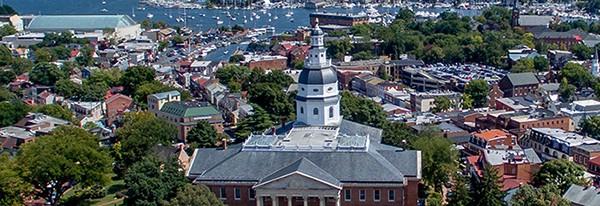Date:
Historic Annapolis, in partnership with philanthropist and Maryland native David M. Rubenstein and the Maryland State Archives, will present an exhibition of four of the most important documents in early American history. Entitled Founding Freedoms: The Essential American Documents, the exhibition will be on display and accessible to the public in the rotunda of the Maryland State House from September 10 to October 11, 2021. The State House is open every day from 9 a.m. to 5 p.m. and entry is free of charge.
Founding Freedoms will consist of important printings of the Declaration of Independence, United States Constitution, and Bill of Rights, all from Mr. Rubenstein's collection, presented in a historical context alongside the State House's permanent display of George Washington's 1783 Resignation Speech. Together they tell the story of the formation of the United States from the patriotic ideals of the Thirteen Colonies in the Revolutionary War to the democratic principles of the Founding Generation in their creation of our government.
Examples of the Declaration of Independence include a rare William Stone engraving of the original document in the National Archives. Famous for being the version of the Declaration seen in textbooks instead of the original, this copy was presented by then-Secretary of State John Quincy Adams to Maryland politician Thomas Emory in 1824. Also included in the exhibition are the first newspaper printing of the Constitution and an early newspaper printing of the Bill of Rights, prior to its ratification, when it included 12 amendments.
Founding Freedoms also tells the story of those who printed our country's most cherished documents and their reasons for creating them. Whereas the printers of the Constitution and Bill of Rights were sharing the news of the day, two of the most notable printings of the Declaration of Independence were done to satisfy our country's burgeoning first wave of patriotism. Appearing in the exhibition are the engraved Declarations by John Binns and Benjamin Tyler—and the colorful story of their race to be the first to print the document.
Mr. Rubenstein's documents, chosen in collaboration with the Maryland State Archives, will stand with and thematically complement the original, handwritten 1783 speech by George Washington, in which he resigns as commander-in-chief of the Continental Army. Considered one of Washington's most important precedent-setting decisions, its central place in Founding Freedoms signifies its real and symbolic role in the transfer of power from the British King, not to an American military leader, but to a democratically elected Congress.
In displaying these documents adjacent to the resignation speech, visitors will have the rare opportunity to see, all at once, the four most important founding documents in American history. “Together, the documents bring to life a pivotal moment in history and provide a tangible connection to the efforts of our nation’s founders to secure rights and freedoms in the earliest moments of American democracy,” says Elaine Rice Bachmann, Maryland State Archivist and Secretary of the State House Trust.
“Seeing historic documents in person brings them alive in ways that images online or in a book cannot,” says David M. Rubenstein. “I am hopeful the Founding Freedoms exhibit will attract a range of generations and prompt a fresh appreciation for our great American experiment.”
“These documents symbolize the birth and development of a new nation and will draw attention to the crucial role Annapolis and Maryland played in the nation’s founding. We appreciate the support of the State House Trust in making these documents accessible to the public, and thank Mr. Rubenstein for bringing them to Annapolis so we can highlight the vital role of Maryland’s citizens, past and present, in guaranteeing that these rights are preserved for all today,” says Robert C. Clark, President and CEO of Historic Annapolis.
Founding Freedoms is the first of three exhibitions coming to Annapolis this fall, to include Historic Annapolis’s permanent exhibit, Annapolis: An American Story, at the Historic Annapolis Museum, 99 Main Street, and We Hold These Truths: Maryland's Signers and the Declaration of Independence, at the William Paca House and Garden, 186 Prince George Street.
About David M. Rubenstein:
A native of Baltimore, David M. Rubenstein is co-founder and co-chairman of The Carlyle Group, a global investment firm. In addition to his loan of a 1297 Magna Carta to the National Archives, Rubenstein has also provided to the U.S. government long-term loans of his rare copies of the Declaration of Independence, the U.S. Constitution, the Bill of Rights, the Emancipation Proclamation, the 13th Amendment, the first map of the U.S. (Abel Buell map), and the first book printed in the U.S. (Bay Psalm Book).
Rubenstein is chairman of the Boards of the John F. Kennedy Center for the Performing Arts, the Council on Foreign Relations, and the Economic Club of Washington.
Rubenstein has been a leader in the area of Patriotic Philanthropy, having made transformative gifts for the restoration or repair of the Washington Monument, Monticello, Montpelier, Mount Vernon, Arlington House, Iwo Jima Memorial, the Kennedy Center, the Smithsonian, the National Archives, the National Zoo, the Library of Congress, and the National Museum of African American History and Culture.
Rubenstein is the host of The David Rubenstein Show: Peer-to-Peer Conversations on Bloomberg TV and PBS and host of Bloomberg Wealth with David Rubenstein, also on Bloomberg TV; he is the author of The American Story: Conversations with Master Historians, published by Simon & Schuster in October 2019, and How to Lead: Wisdom from the World's Greatest CEOs, Founders, and Game Changers, published by Simon & Schuster in September 2020.
A magna cum laude graduate of Duke University, Rubenstein graduated in 1973 from The University of Chicago Law School, where he was an editor of the Law Review. After practicing law in New York, he served from 1975 to 1976 as Chief Counsel to the U.S. Senate Judiciary Committee’s Subcommittee on Constitutional Amendments. From 1977 to 1981, during the Carter administration, Rubenstein was Deputy Assistant to the President for Domestic Policy.
About Historic Annapolis:
Established in 1952, Historic Annapolis is the leading nonprofit preservation and history organization in Annapolis, Maryland. HA's mission is to Preserve and Protect the historic places, objects, and stories of Maryland’s capital city, and provide engaging experiences that Connect people to the area’s diverse heritage. For more information or to get involved with Historic Annapolis, visit www.annapolis.org. In addition to the Founding Freedoms exhibit, Historic Annapolis will open two additional exhibits this fall: Annapolis: An American Story, at the Historic Annapolis Museum at 99 Main Street, opens in late November and We Hold These Truths: Maryland's Signers and the Declaration of Independence, at the William Paca House, 186 Prince George Street, opens in late September.
About the Maryland State House:
With its cornerstone laid in 1772 nearly 250 years ago, the Maryland State House is the oldest state capital in continuous legislative use and is the only state house ever to have served as the nation’s capital. The Continental Congress met in the Old Senate Chamber from November 26, 1783 to August 13, 1784. During that time, George Washington came before Congress to resign his commission as commander-in-chief of the Continental Army and the Treaty of Paris was ratified, marking the official end of the Revolutionary War. The State House is where the Maryland General Assembly convenes for three months each year, and the elected leadership of the state — the governor, lieutenant governor, speaker of the House of Delegates and president of the Senate — all have their offices here. The State House is open to the public every day from 9 a.m. to 5 p.m. except Christmas and New Year’s Day. The Maryland State Archives oversees the interpretation and exhibitions at the State House highlighting four centuries of Maryland History.


